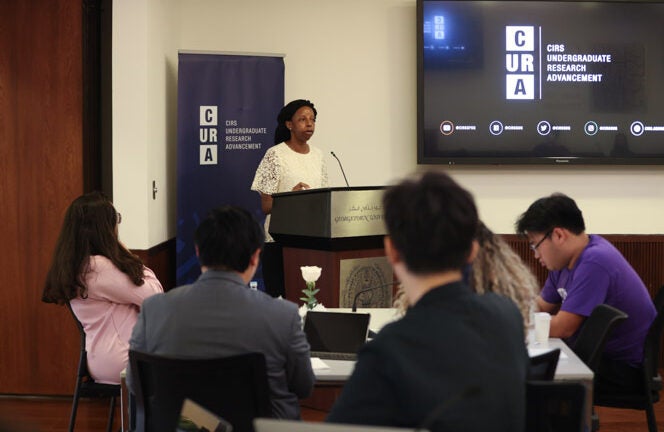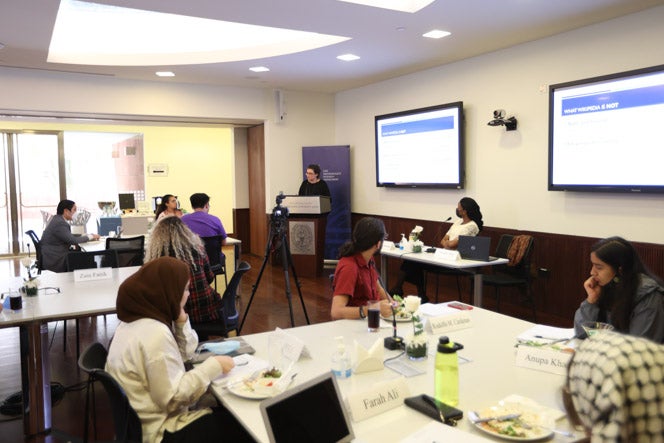Student Engagement
CURA Workshop: Writing Women into Wikipedia: Information Creation and Peer Review

On August 11 and 18, 2022, CIRS hosted a two-part workshop for undergraduate students titled, “Writing Women into Wikipedia: Information Creation and Peer Review.” The workshop was offered under the CIRS Undergraduate Research Advancement (CURA) Program, and was co-led by GU-Q Faculty Professor Phoebe Musandu, and Paschalia Terzi, GU-Q Librarian.
This workshop taught me to create and edit the websites, but also learn to respect other works as well by giving valuable and reasonable feedback while making the necessary edits/suggestions. Throughout this process, I got to further develop my research skills, especially when you need to find out an information about someone who is not well known in online platforms when you try researching in English.
– Nafisa Sagdullaeva, GU-Q Class of 2026
Over the course of two days, 15 Georgetown University in Qatar and Northwestern University in Qatar students learned about the information creation and peer review process using Wikipedia articles as a model. The workshop was adapted by Terzi from a recent project report published in the Journal of Information Literacy (Thomas, Jones & Mattingly, 2021). Professor Musandu opened the workshop with a presentation contextualizing the themes and goals of the workshop in the bigger picture of the bias that is presented in Wikipedia. Her presentation highlighted the importance of analyzing information sources to determine whose voices are represented, and whose are being left out.
Wikipedia is an online encyclopedia that relies on a community of editors to create, revise, and remove articles from the website based on Wikipedia’s policies and guidelines. It is a common misperception that anyone can write or edit anything on Wikipedia at any time without oversight. While this is true to an extent, what is often not known is that every article and edit is reviewed by experienced Wikipedia editors who will remove the edits or article itself if found to be outside of Wikipedia’s policies and guidelines. Information presented in Wikipedia articles should be from a neutral point of view, verifiable, and not original research.
Professor Musandu explained how bias enters into Wikipedia – evidenced not only in the authors and subjects of articles, but also within the community of editors. Since Wikipedia’s guidelines require all information in articles to be verifiable, only secondary sources may be used to source articles. Professor Musandu explained why this can be an issue – authors of secondary sources may insert their own biases into their work, which is then replicated in the Wikipedia article. Secondary sources reflect the social norms, mores, and values that were evident at the time of writing, thus perpetuating the biases through generations.

I learnt how I can critically review the articles posted on Wikipedia, and post my own and ultimately become a Wikipedian.
– Zarrish Ahmed, GU-Q Class of 2026
In this workshop, students focused on the underrepresentation of women in the world of Wikipedia. Regarding the content of Wikipedia itself, women are underrepresented in articles. Within articles themselves, how women are represented is often very narrow and reduced to their role in relationship to a male, or relegated to matters of social and purely feminine affairs, advancing unhelpful stereotypes. For example, in the Wikipedia article “Women in Qatar,” the first sentence is “Women’s rights in Qatar are restricted by the country’s male guardianship law and influenced by the Wahhabi interpretation of Islam” (Wikipedia, 2022).
Women are also underrepresented in the community of Wikipedia editors. In addition to the fewer number of women editors, Shane-Simpson and Gillespie-Lynch (2017) suggest five reasons for the gender gap, including the inclination of women to discuss more and edit content less, perception and interaction with other editors, and gender issues in quantity of leisure time available. This is why the workshop focused specifically on women and Wikipedia. It is the hope of the facilitators that students will choose to become Wikipedia editors themselves.
After the presentation, students worked in groups to write articles about Qatari women in the fields of politics, science, education, art, and business. During the second session on August 18, the facilitators gave each group the article of another group in an anonymous manner to review in a peer review exercise. At the end of the two-part Workshop, students had the opportunity to publish their articles and engage with the global community of Wikipedia editors on their biographical contributions. As Anupa Khanal, GU-Q class of 2026 stated after the workshop, “I would like to devote more time on writing articles on women who are unrepresented and also work on peer reviews.”
Watch a video of the presentation by Professor Phoebe Musandu and Paschalia Terzi here.
Article by Elizabeth Wanucha, CIRS Operations Manager